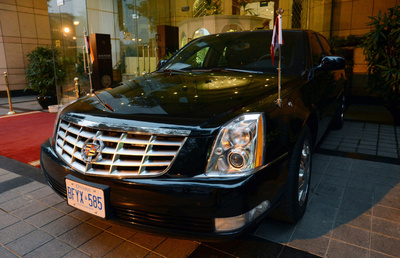Canadian Prime Minister, Stephen Harper, his wife Laureen, International Trade Minister Ed Fast, a coterie of aides, and upwards of 70 security officials touched down in New Delhi for a five day trade mission. The federal government’s agenda is to promote some 14 trade and investment deals between Canadian and Indian companies, reportedly representing $2.5 billion (current Canadian-Indian bilateral trade is on the order of $5.2 billion).
The economic flag-waving has been overshadowed by the discovery that the Prime Minister arranged the shipment of two armored vehicles from Canada to ferry him and members of his entourage around. CBC News confirmed that a C-17 military transport plane was used to fly the vehicles (an SUV and a black Cadillac sedan) to India. This is a highly unusual move, given that on international visits the Prime Minister normally employs armored vehicles that provided by the host country or rented locally. This is standard procedure for virtually all international leaders. Indeed, the only head of state who consistently travels with his own security vehicles is the United States president.
 Only twice previously, during state visits to Afghanistan and Haiti, has the Canadian Prime Minister brought his own security fleet. The Prime Minister’s security extravagance is particularly perplexing given that officials with the Indian Ministry of External Affairs confirmed to the Canadian Press “on condition of anonymity that Harper had been offered an armored Mercedes for his entire visit — with the exception of a stop in Bangalore where it was the state government taking care of his car.”
Only twice previously, during state visits to Afghanistan and Haiti, has the Canadian Prime Minister brought his own security fleet. The Prime Minister’s security extravagance is particularly perplexing given that officials with the Indian Ministry of External Affairs confirmed to the Canadian Press “on condition of anonymity that Harper had been offered an armored Mercedes for his entire visit — with the exception of a stop in Bangalore where it was the state government taking care of his car.”
So, in these times of austerity, how many “hard-earned Canadian tax dollars” did the Prime Minister spend on this security indulgence?
It costs $21,239 per flying hour for a C-17 military transport plane, and the flying time between Ottawa and New Delhi is approximately 14 hours and 40 minutes (depending on stops and the route taken). Thus, one-way expenses are $311,364, or for return trip $622,728.
 Even if the Prime Minister had qualms about the free armored vehicles that were available to him from the Indian government and the state of Karnataka (where Bangalore is situated), he could have availed himself (like all other leaders) of rented armored vehicles available commercially. A quick survey shows that, depending on the vehicle, its features (hardened ballistic steel, armour-reinforced body panels, explosive protection, 40 mm polycarbonate bulletproof glass, built in smoke-screen system, dual ram bumpers, etc.) and the level of protection required (ranging from Level 3 to Level 7) armored vehicles rentals range between $3,500 and $1,280 per day. Therefore, using the upper end cost of $3,500 (a great deal, since it includes a security high risk driver and two professional protective agents …), for a five day visit it would have cost the Prime Minister $35,000 for two top-notch armored vehicles. This would be $587,728 less compared to the $622,728 that Canadian taxpayers will shell-out for the Prime Minister’s security extravagance — in addition to saving all the jet fuel to travel 22,600 kilometers, which burned at high altitude has a climate change multiplier effect of between 2.0-4.0 (average 2.7) compared to fuel burned at ground level (see Calculating carbon dioxide emissions of flights).
Even if the Prime Minister had qualms about the free armored vehicles that were available to him from the Indian government and the state of Karnataka (where Bangalore is situated), he could have availed himself (like all other leaders) of rented armored vehicles available commercially. A quick survey shows that, depending on the vehicle, its features (hardened ballistic steel, armour-reinforced body panels, explosive protection, 40 mm polycarbonate bulletproof glass, built in smoke-screen system, dual ram bumpers, etc.) and the level of protection required (ranging from Level 3 to Level 7) armored vehicles rentals range between $3,500 and $1,280 per day. Therefore, using the upper end cost of $3,500 (a great deal, since it includes a security high risk driver and two professional protective agents …), for a five day visit it would have cost the Prime Minister $35,000 for two top-notch armored vehicles. This would be $587,728 less compared to the $622,728 that Canadian taxpayers will shell-out for the Prime Minister’s security extravagance — in addition to saving all the jet fuel to travel 22,600 kilometers, which burned at high altitude has a climate change multiplier effect of between 2.0-4.0 (average 2.7) compared to fuel burned at ground level (see Calculating carbon dioxide emissions of flights).
What therefore, is the point of this $622 thousand dollars indulgence on the part of Stephen Harper? It makes former Minister of International Cooperation Bev Oda’s $16 glass of orange juice sound like a fantastic bargain for Canadian taxpayers. Perhaps to appear more “presidential” on the eve of an American election? Whatever the motivation, what is certain is that Canadian taxpayers are on the hook to pay for Stephen Harper’s armored extravagances.
Christopher Majka is an ecologist, environmentalist, policy analyst, and writer. He is the director of Natural History Resources and Democracy: Vox Populi.




